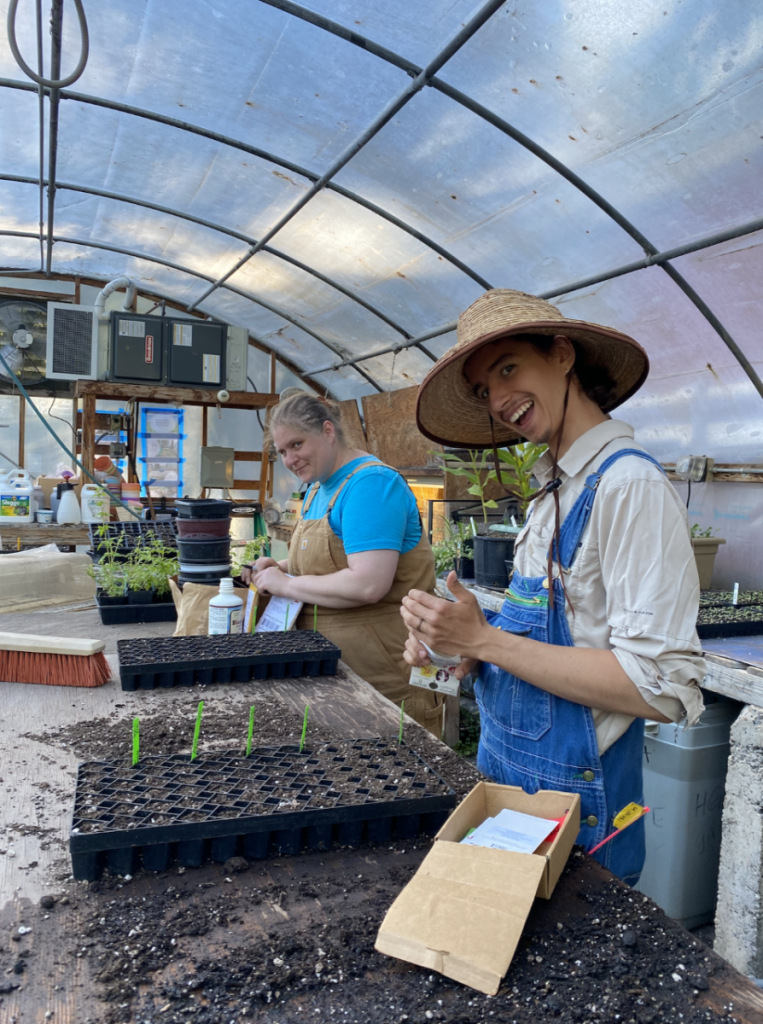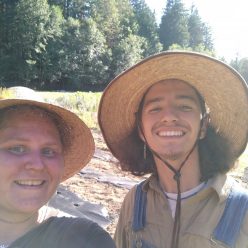Early Slotted Radicchio, Winter Cabbage, and Buckwheat: Yield, Pest Resistance, and Sensory Evaluation
Faculty:
- Dr. Steve Scheuerell, scheuers@evergreen.edu – Spring
- Dr. Angelos Katsanis, katsania@evergreen.edu – Summer
- Dr. Sarah Williams, williasa@evergreen.edu – Fall
Students:
- Sarah Dyer, sarah.dyer@evergreen.edu
- Andrew Luttinen, lutand24@evergreen.edu

Description:
This field research project facilitates learning of field plant trials, health management, agronomy, and sensory assessment protocols in relation to the movement for inclusive, just, sustainable, and participatory food and ag practices. The project will follow research specifications to address issues including but not limited to yield, production, and culinary concerns. The student will gather data on early slotted radicchio, winter cabbage, and buckwheat varieties regarding growth habits, disease, and insect pest infestations. Data also will be gathered on the maturity and grading of harvested radicchio and cabbage heads, picking ease, flavor profiles, and overall yield and harvest potential. Fall and winter quarter tasting labs will use the sensory assessment protocols developed by Lane Selman, Oregon State University, for the Culinary Breeding Network, including attention to seed sovereignty, political economy, and community-based food systems.
The fellow will gain a capstone project experience. The Food and Agriculture Path of Study will utilize the project documentation for recruitment and retention, and participation in field trials will enhance our curriculum by creating connections with participating institutions, produce for sensory assessment labs, and an on-campus field research site for demonstrating design, plot maintenance, data collection and analysis. A video from our 2019 field trial is featured on NOVIC national website. The role of participatory field trials in food and ag education will be featured in a roundtable of Evergreen students, alumni, and faculty at the 2022 Organic Seed Growers Conference.
Expertise required of fellows:
The potential SURF student should have:
- the ability to handle and grow plants in the field is required.
- experience with ecological data collection (especially in the field)
- introductory data analysis using Excel
- experience writing scientific lab reports
- excellent communication skills including visual and website literacies
- aptitude for sensory assessment
- a passion for food and agriculture
- self-motivation and time management skills are essential
Faculty are willing to work with the potential fellow to improve these skillsets. The project may require a commitment of 20-30 hours some weeks and less other weeks. Given the length of the growing season, interested students should contact faculty about ILC and internships options spring and fall quarters.
Responsibilities of fellows:
Student(s) will have different duties as the season progresses. They will:
- plant seeds
- care for seedlings
- transplant seedlings to the field they have prepared
- maintain the field plots including irrigation, weed management, trellis installation, and plant pruning/training
- collect data and gain experience in writing and data analysis
Student(s) will spend approx. 15 h/week monitoring the field experiment and documenting all necessary data. Fellow(s) will be expected to spend up to 5h/week studying relevant reading material, writing and analyzing gathered data, and logging the activities online. Faculty will provide an ePortfolio template for data collection, weekly reporting, and project documentation including photographs. Members of the faculty team will meet with the student(s) to discuss data reports and consult on data analysis and documentation of the project. Meetings early in the project will be necessary to lay out the research design, schedules, and proper use of lab and field equipment. Interested students are encouraged to consult with the faculty team ASAP regarding their spring and fall quarter academic coursework, which could include related ILCs or participation in Food and Agriculture programs.
SURF Fellowship Expectations:
- Work on the project 20 or more hours per week
- Work 12 weeks (mid-June through mid-September). Fellows may make flexible schedule plans with faculty.
- Participate in:
- an opening reception for the program in June
- activities with other fellows during the summer
- presentations of their work at a fall event
- participate in other events throughout the year as requested
- $3,700 stipend will be awarded after the successful completion of summer quarter.
Additional information:
The faculty recognize issues of inclusion, diversity and equity, particularly in agriculture and the sciences and therefore especially encourages applicants from under-represented groups including women, racial/ethnic identities, and LGBTQA individuals. Of course, all eligible applicants will be considered and are welcome to apply. Given the anticipated length of the growing season, applicants will be encouraged to consider working with one or all faculty team members in some capacity during the spring and fall quarters, either in academic programs or through an ILC.
